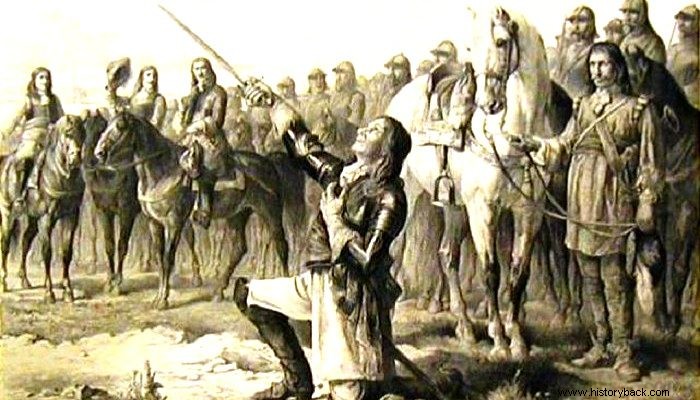
Destiny plays strange games many times and leads a worthy man from utter obscurity to acclaim. Johann von Sporck was such a man. He was born in 1600 on a small farm in Paderborn, Germany. He seems to have received a good education assisted by his three brothers, one of whom worked for the local bishop and ruler while the other two served in the Bavarian army. At the age of 20, he himself joined the Bavarian army as a drummer... Together with his older brother, he fought, now in the cavalry, in the famous battle of the White Mountain (1620) in which, however, his brother was killed.
Spork continued to fight throughout the Thirty Years' War, distinguishing himself for his bravery, earning points, reaching the rank of colonel in 1639, something unlikely for someone who started out as a mere soldier. In 1643, he formed his own cavalry regiment at the head of which he routed the French at Tutlingen in 1645. In the same year, he distinguished himself in the battle of Jankau, where he was seriously wounded and captured by the Swedes. Released in 1646, he was promoted to major general and a year later to lieutenant general, transferring to Austrian service.
The Slaughterer of the Turks
The Treaty of Westphalia ended the disastrous Thirty Years' War, and Spork retired to the estates bestowed upon him by the emperor. However, in 1657 he returned to the army and fought against the Swedes in northern Germany, while in 1661 he was in Transylvania fighting the Turks for the first time. When the Turks invaded the imperial lands, Sporck, under the orders of the great general Raimondo Montecucoli, was at the head of the imperial cavalry, near the monastery of St. Gotthard, where in 1664 the battle of the same name took place.
Spork was in charge of the right horn of the Christian army covering the passes there on the river Raab in Hungary. Spork had some German cuirassiers, about 2,000 "Croats" (light cavalry ancestors of the hussars) and a few infantry. The Battle of St. Gotthard evolved into three main phases. Initially the Turks, who outnumbered the Christians 6:1 (various Germans, Austrians, French, Croats, Serbs, Hungarians), crossed the river in the center and left of the Christian line.
The head of the Christian army Marshal Montecucoli counterattacked, but his few men were overwhelmed by the thousands of the enemy. A new Christian counter-attack followed which stopped the Turks for a while. Having regrouped his forces, Montecucoli ordered a general counter-attack. Spork then alighted from his horse, took off his helmet, knelt down, and prayed with these words:“Great Commander-in-Chief, if you do not wish to help your Christian children, at least do not support the Turkish dogs. Just watch and you'll be happy!
Immediately afterwards he put on his helmet, mounted his horse, drew his sword and was the first to charge against the enemies, despite his 64 years! His men eagerly followed him and fell furiously upon the Turks. The Muslims were numerous but nevertheless Spork and his men continued to fight with the same vigor for over three hours, until the Turks "broke", they changed and fled in disorderly and shameful flight!
Spork's light cavalry pursued them and slaughtered them for a while. Spork himself was red with the blood of the enemies he had slaughtered. According to the sources, his helmet and breastplate were dripping with Turkish blood. His prayer had been... fulfilled. After the battle, Spork became a field marshal and engaged in the pacification of Hungary. Later he also fought against the French in the Dutch War and even distinguished himself by always fighting in the front line despite his age. He retired in 1676 from active duty and died three years later. He was considered the best cavalry general of his time and the scourge of the Turks.
PANTELIS D. KARYKAS
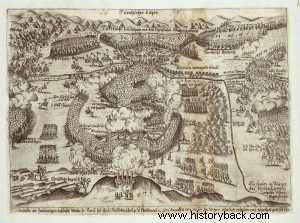
The battle of Saint Gotthard.
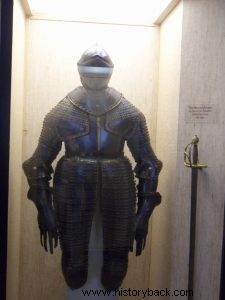
Spork's armor and sword.
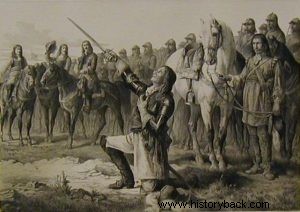
Spork prays before the big counterattack against the Turks.
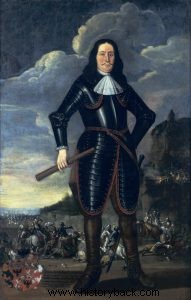
Spork with the baton.
